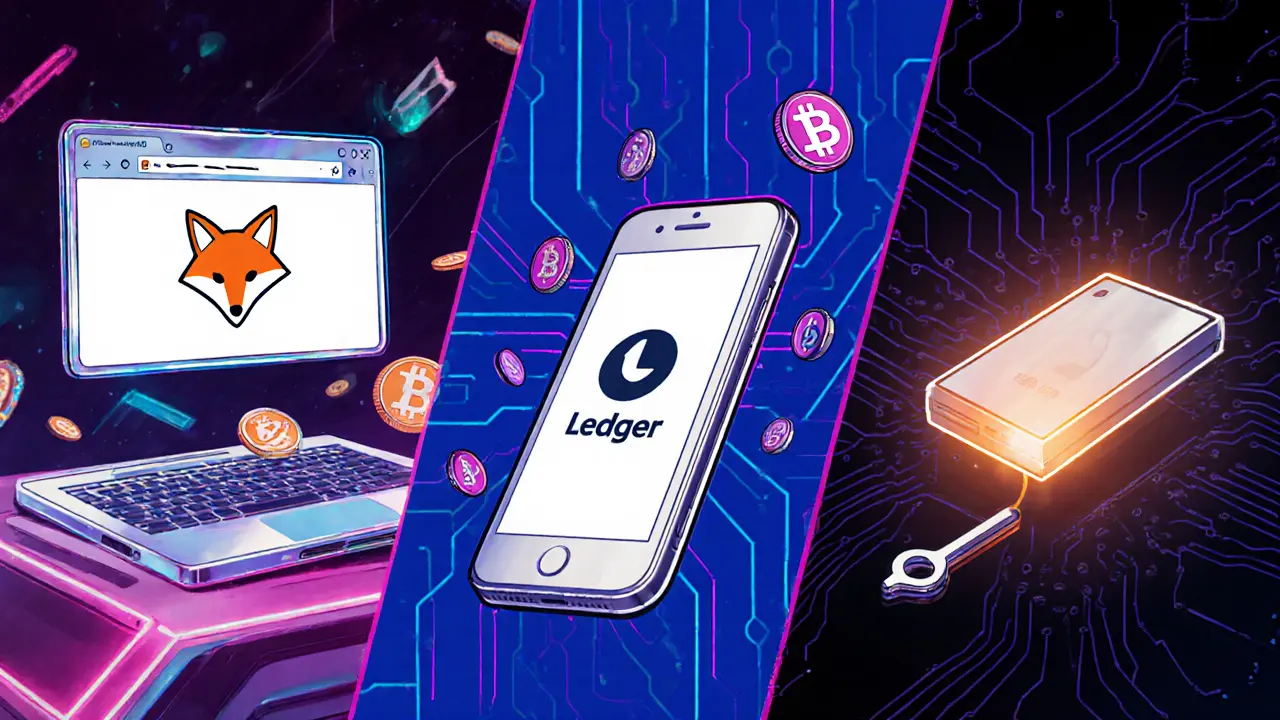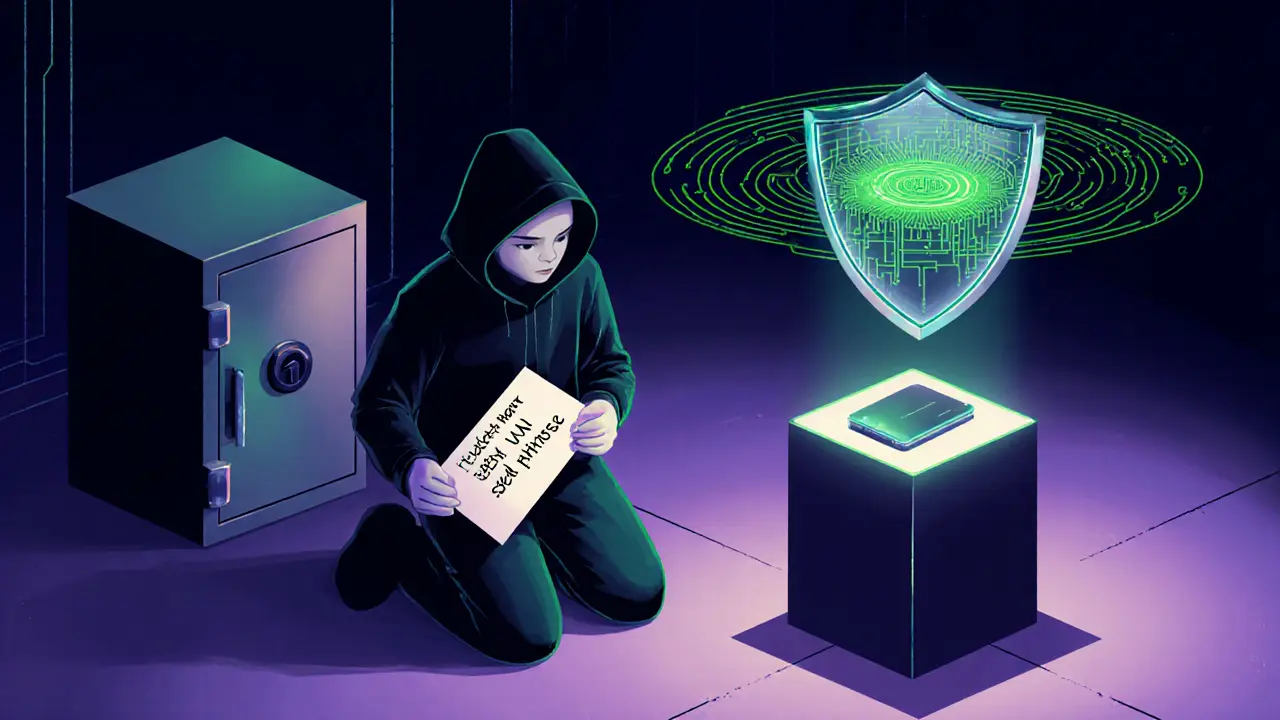How Non-Custodial Crypto Wallets Bypass Restrictions in High‑Risk Countries
 Jun, 25 2025
Jun, 25 2025
Crypto Wallet Risk Assessment Tool
Determine Your Wallet Security Needs
Answer these questions to get personalized recommendations for non-custodial wallets in high-risk jurisdictions.
Results
When a government bans or heavily monitors cryptocurrency, the first tool many turn to is a non‑custodial crypto wallet. Unlike exchange‑hosted accounts, these wallets let you hold the private keys yourself - meaning no middle‑man can freeze or seize your funds. For people living where crypto is prohibited or heavily regulated, that self‑ownership can be a lifeline.
In the next sections we’ll unpack why non‑custodial wallets matter, walk through the most common options, flag the biggest risks, and give you a practical checklist to stay safe while staying sovereign.
Why Self‑Custody Beats Centralized Services in Restricted Jurisdictions
Governments that outlaw crypto usually target exchanges, custodial wallets, and any service that requires a Know‑Your‑Customer (KYC) check. When a bank or exchange is forced to shut down, users lose access to their holdings. The 2022 FTX collapse illustrated that even large custodial platforms can disappear overnight, leaving billions in limbo.
Because a non‑custodial wallet does not store your keys on a server, there is no single point that authorities can lock down. As long as you keep your recovery phrase hidden and your device functional, you retain full control over assets on blockchains like Bitcoin and Ethereum.
How Non‑Custodial Wallets Actually Work
When you install a wallet, it generates a 12‑ to 24‑word seed phrase. That phrase is a human‑readable version of the private key that signs every transaction. The wallet software signs transactions locally, then broadcasts the signed data to the network. No personal data is required, so you can create an account instantly, even behind a VPN.
Key technical points:
- Private keys never leave your device unless you export them.
- Transaction fees are purely blockchain fees - there are no hidden service charges.
- Compatibility spans multiple chains (Ethereum, Binance Smart Chain, Solana, etc.) but you must add each network manually in many wallets.
Popular Non‑Custodial Wallet Types
Below is a quick snapshot of the three main formats you’ll encounter.
| Format | Example | Device needed | Security level | Typical cost |
|---|---|---|---|---|
| Browser extension | MetaMask | Desktop browser | Medium - keys stored locally, vulnerable to phishing | Free |
| Mobile app | Trust Wallet | Smartphone (iOS/Android) | Medium - same local storage, easier backup on the go | Free |
| Hardware device | Ledger Nano S / Ledger Nano X | USB or Bluetooth hardware | High - keys never leave the device, protected by PIN | $79 - $149 USD |
Security Best Practices for High‑Risk Environments
Even though non‑custodial wallets remove a central point of failure, they shift the burden to you. Follow these steps to keep your crypto safe while living under restrictive laws:
- Write down the seed phrase on paper and store it in two separate locations (e.g., a safe and a hidden envelope).
- Consider a Shamir backup (split‑secret) if you own a Ledger Nano X; this allows you to reconstruct the phrase from multiple fragments.
- Use a reputable VPN or Tor to access wallet interfaces, especially when public Wi‑Fi is the only option.
- Enable any built‑in PIN or password on hardware devices; never reuse passwords across services.
- Test a small transaction first to confirm you can both send and receive funds before moving larger sums.

Legal and Regulatory Landscape
Restrictions vary widely. Some countries (e.g., Iran, Algeria) outright ban crypto trading, while others impose heavy KYC on exchanges but leave personal holdings untouched. The key legal takeaway:
- If you only hold crypto in a non‑custodial wallet, most jurisdictions cannot prove ownership without your private key.
- Buying or selling through a regulated exchange still triggers AML checks, so many users rely on decentralized exchanges (Uniswap, PancakeSwap) accessed via the wallet.
- Penalties for “using” crypto can include fines or imprisonment; the safest approach is to keep transaction volume low and avoid public promotion.
Pros & Cons Checklist
| Benefit | Drawback |
|---|---|
| No KYC - you stay anonymous. | Full responsibility for key loss. |
| Resistant to government seizure. | Steeper learning curve. |
| Access to global DeFi markets. | Limited official support if anything goes wrong. |
| Low or zero service fees. | Potential phishing attacks if you’re not careful. |
Step‑by‑Step: Setting Up a Secure Wallet in a Restricted Country
The process below works for any of the three formats, but we’ll use MetaMask as the example because it’s free and widely supported.
- Download the MetaMask extension from the official site. Avoid third‑party mirrors.
- Open the extension, click “Create a Wallet,” and set a strong password you’ll remember.
- MetaMask will present a 12‑word seed phrase. Write it down on paper - never store it digitally.
- Verify the phrase by entering the words back into the app.
- Switch the network to “Ethereum Mainnet” or add a custom RPC for Binance Smart Chain if you need BEP‑20 tokens.
- Acquire crypto through a peer‑to‑peer platform (e.g., local “OTC” groups) or a decentralized exchange using the “Swap” feature.
- When using a DEX, copy the contract address directly from the official project page to avoid scam tokens.
- Once you have a few tokens, test a <0.001 ETH> transaction to a trusted friend’s address to confirm everything works.
- Consider moving a larger portion to a hardware wallet for long‑term storage.

When to Upgrade to a Hardware Wallet
If you plan to hold more than a few thousand dollars worth of crypto, the added security of a device like the Ledger Nano X is worth the price. Hardware wallets keep your private keys offline, making remote attacks virtually impossible. They also come with built‑in passphrase protection, which can give you plausible deniability if you ever get questioned by authorities.
Future Trends That Could Affect Restricted Users
Developers are experimenting with multi‑signature wallets and threshold cryptography (MPC) that require multiple devices to sign a transaction. While still early, those solutions could let a user split the seed across several encrypted backups, reducing the risk of a single point of failure. Another trend is “cross‑chain bridges” that let you move assets between blockchains without using a centralized exchange - a potential workaround for nations that block specific networks.
Bottom Line
In countries where crypto is under siege, the only reliable way to keep your assets under your control is a non‑custodial wallet. It removes KYC, nullifies most seizure attempts, and opens the door to global DeFi. But the freedom comes with the duty to protect your keys, learn the technology, and stay aware of local legal risks. Follow the security checklist, start small, and consider moving serious holdings to a hardware device. With those steps, you can maintain financial sovereignty even when the state tries to take it away.
Can I use a non‑custodial wallet without an internet connection?
You need an internet connection to broadcast transactions, but you can generate and store your seed phrase completely offline. Hardware wallets keep signing offline and only connect briefly to broadcast the signed data.
Is it illegal to own a non‑custodial wallet in a restricted country?
Most jurisdictions criminalize the act of buying, selling, or using crypto, not merely holding it. A wallet that never connects to a regulated exchange is often a gray area, but you should check local laws before making large transactions.
What happens if I lose my seed phrase?
You lose access to every address that the phrase controls. There is no password reset or customer support to recover funds, so backups are essential.
Do non‑custodial wallets charge any fees?
The wallet itself is free. You only pay the blockchain’s network fee (gas) for each transaction. Some mobile apps may add optional services, but the core wallet does not charge.
How do I stay anonymous while using a wallet?
Avoid linking your wallet address to personal accounts, use a VPN or Tor to hide your IP, and never share your seed phrase. Decentralized exchanges let you trade without KYC, but be careful with phishing sites.
Ray Dalton
October 23, 2025 AT 19:35Just wanna say this guide is one of the clearest I've seen on non-custodial wallets. I've helped three friends in restrictive countries set up MetaMask after reading this - all of them are now holding ETH and USDT without fear of account freezes. Seriously, the checklist alone is worth its weight in bitcoin.
Peter Brask
October 23, 2025 AT 21:27LOL you guys are all so naive 😂 The government doesn't need to seize your wallet - they just track your IP, your VPN logs, your phone number linked to your OTC deal... and then they show up at your door with a warrant and a taser. Hardware wallets? More like hardware targets. They're watching. Always watching. 🕵️♂️🔒
Trent Mercer
October 24, 2025 AT 05:45Look, I appreciate the effort, but this reads like a Medium post written by someone who’s never actually held crypto in a repressive regime. You mention ‘peer-to-peer OTC groups’ like they’re harmless coffee meetups. Have you ever tried to find one in Iran? Half of them are honeypots run by the IRGC. And MetaMask? Please. It’s basically a browser extension that leaks your IP unless you’re running it inside a VM with Tor - which 99% of people won’t do. This is amateur hour.
Kyle Waitkunas
October 24, 2025 AT 22:27OH MY GOD I JUST REALIZED - this whole thing is a trap!!! They want us to use non-custodial wallets so they can track the blockchain forever and build a global surveillance ledger!!! Every transaction is a fingerprint!!! They’re using DeFi to normalize financial tracking under the guise of ‘freedom’!!! I’ve been using a Ledger since 2021, but I only send 0.0001 ETH at a time and I wipe my device after every use!!! I even bury the paper seed in my backyard under a rock labeled ‘Dad’s Old Tools’ because I know they’ll dig it up if they come for me!!! PLEASE TELL ME I’M NOT ALONE IN THIS!!!
vonley smith
October 25, 2025 AT 08:14Just started using Trust Wallet last week after my cousin in Nigeria got his exchange account frozen. This guide saved me from making a dumb mistake. Took me 20 minutes to set up, wrote the phrase on paper, kept the phone locked. No big deal. You got this. Start small, stay calm, and don't panic if you mess up the first time - I did. Everyone does.
Melodye Drake
October 26, 2025 AT 03:34It’s charming how everyone thinks they’re some kind of crypto revolutionary with a MetaMask extension. Meanwhile, the real power players use MPC wallets, multi-sig setups, and private nodes - not some free browser plugin that auto-connects to OpenSea. And let’s be honest: if you’re relying on a 12-word phrase written on paper, you’re already one phishing email away from losing everything. This isn’t sovereignty - it’s financial negligence dressed up as rebellion.
paul boland
October 26, 2025 AT 10:34USA telling the world how to do crypto? 😂 Ireland has been using crypto since 2014 and we didn’t need a 10-page guide to figure out that you don’t trust banks. We just use wallets and move on. Also, hardware wallets? Too expensive. I use a phone and a QR code. Simple. Efficient. Not like you Yanks who need 17 layers of security because you’re scared of your own shadow 🇮🇪😎
harrison houghton
October 27, 2025 AT 06:33Freedom is not a feature. It is a condition of being. When you hold your own keys, you are not merely transacting - you are affirming the ontological truth that no state can own your identity. The blockchain is not money. It is memory. And memory, once written, cannot be erased by decree. To lose your seed phrase is not to lose assets - it is to lose the very act of self-assertion in a world that demands compliance. This is not finance. This is philosophy in motion.
DINESH YADAV
October 27, 2025 AT 17:26India has banned crypto and you think a wallet will save you? HA! Police track everything. Even if you use Tor, they get your phone IMEI. You think Ledger is safe? They confiscate it. You think paper is safe? They burn it. You think no KYC helps? They arrest you for 'illegal foreign exchange'. This guide is useless. Real solution? Don't touch crypto. Stay poor. Stay safe. Stop spreading lies.
rachel terry
October 27, 2025 AT 19:34Wow so much text for something so simple. You don’t need a checklist. You just need to not be dumb. Write down your phrase. Don’t screenshot it. Use a hardware wallet if you’re rich. Done. Why does everyone need a 12-step program to hold digital money? It’s not rocket science. Stop overcomplicating it.
Susan Bari
October 28, 2025 AT 00:42Non-custodial wallets are the only true expression of financial autonomy in a world where your bank account is a leash. But let’s be real - if you’re using a mobile wallet in a country with state surveillance, you’re already compromised. The real sovereigns use air-gapped machines, offline signing, and encrypted Shamir backups. Everything else is cosplay. I’ve got 17 wallets. None of them are connected to the internet. That’s what freedom looks like.
Sean Hawkins
October 28, 2025 AT 09:26Just a quick technical add-on: when using a hardware wallet like Ledger, always enable the passphrase feature (BIP-39) - it creates a hidden wallet that’s indistinguishable from the main one. If you’re ever coerced into revealing your seed, you can give them the passphrase-less version and keep your real funds safe. It’s called plausible deniability, and it’s been used by journalists and dissidents for years. Also, never trust wallet apps from third-party app stores - stick to official sources only. Trust but verify.
Marlie Ledesma
October 28, 2025 AT 23:14I just wanted to say thank you for writing this. My sister lives in Venezuela and she’s been terrified to even open an app. I sent her this and she cried. She said she finally feels like she has a way to protect what little she has. You didn’t just write a guide - you gave someone hope. That matters more than any token.
Daisy Family
October 29, 2025 AT 05:17MetaMask? Really? That thing is basically a spyware factory. I used it once and my browser started redirecting to fake swap sites. Also who even uses paper anymore? That’s so 2018. I just memorize my phrase and burn the paper. Like a true crypto ninja 🥷✨